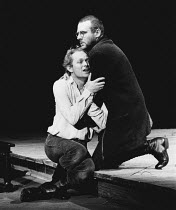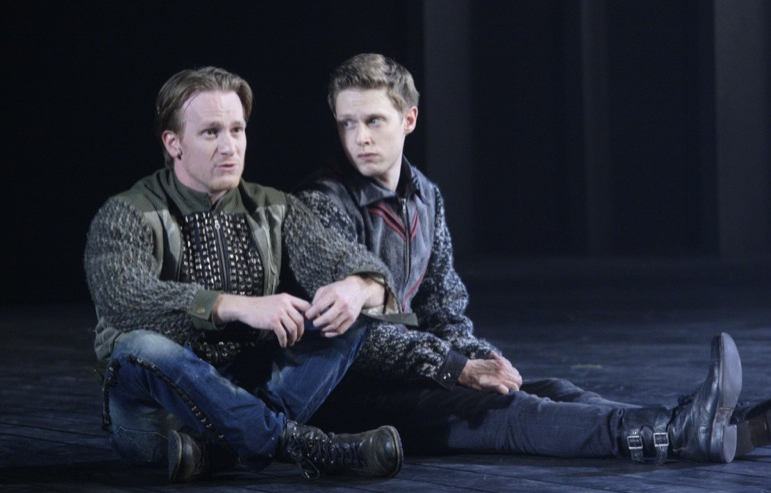No! I am not Prince Hamlet, nor was meant to be;
The Love Song of J Alfred Prufrock
Am an attendant lord, one that will do
To swell a progress, start a scene or two,
Advise the prince; no doubt, an easy tool,
Deferential, glad to be of use,
Politic, cautious, and meticulous;
Full of high sentence, but a bit obtuse;
At times, indeed, almost ridiculous—
Almost, at times, the Fool.
I encountered T.S. Eliot when I was about 17; Shakespeare I’d known a little longer. Lines like these – allusions which I could actually catch (and Eliot was hugely allusive, especially in his earlier work) – played a part in the thrill of recognition I felt on first reading him. I still, vividly, remember starting to read the Four Quartets for the first time – at home, in the ‘front room’ as we called it (a whole socio-economic digression possible in that term. I will resist). The book was borrowed from Bolton Central Library: we were studying one T. S. Eliot play at ‘A’ level and I loved it. I had discovered that my library ticket, issued in the one-room Blackrod library, also granted access to municipal resources. So I’d ventured out and into this magical labyrinth, progressing for the first time beyond the familiarly parochial spaces, the prescribed curricular texts. A handful of known authors and the Dewey Decimal system were my clues in these first steps of geographic and intellectual exploration. Four Quartets was one of the first fruits. Alone, I sat athwart the armchair with my legs dangling over the side. Afternoon sunshine filtered through the net curtains. I turned the pages. ‘My words echo Thus in your mind’. It was an intense moment then, and remains so in my memory. In The History Boys Hector says:
‘The best moments in reading are when you come across something – a thought, a feeling, a way of looking at things – which you had thought special and particular to you. Now here it is, set down by someone else, a person you have never met, someone even who is long dead. And it is as if a hand has come out and taken yours’
For me, the hand was TS Eliot’s. One thing we shared was the link to Shakespeare. Neither am I meant to be Prince Hamlet. The Prufrockian alternatives are ‘an attendant lord, one that will do to swell a progress, start a scene or two, advise the prince’ (‘almost at times the Fool‘. Another digression I will resist). If you know Hamlet then these phrases conjure Rosencrantz and Guildenstern, Osric, even Polonius. But the attendant lord I aspire to be is Horatio.
My first Hamlet (and yes, I keep a tally as Tracy Emin does lovers) was Michael Pennington – a gentle, hugely sympathetic Hamlet in the romantic vein, a sweet prince. His Horatio was young Tom Wilkinson, before he went off to America and started to deliver stellar performances on film. Tom’s Horatio was the intelligent, loyal, supportive friend and companion I wanted to be, still want to be. Horatio becomes a still point in Hamlet’s shifting manic world. The only way Horatio changes is to become more clearly himself: stalwart, honest, true: Hamlet can and does trust him as he can no-one else. I thought him then, I believe it still, to be a good role model.
There have been seismic changes to my life in recent months and I have felt myself an attendant lord at best, collateral damage more frequently, in someone else’s story. In fiction, it’s acceptable to have minor characters. In order to tell the story, it helps to have identifiable roles, to know who is the protagonist, to identify heroes, villains, sidekicks. Subordinate characters are part of that structure. It helps the reader (or listener or viewer) to know where, as it were, to focus.
Less so in life. Of course we each live our own lives physically bound into an individual point of view and therefore compelled tautologically to be the protagonist in our own life’s drama. An essential part of growing up and maturing is accepting that others’ reality is as genuine to them as is my own to me: that there are, in all senses, other points of view. Thereafter we live in a continual tension between the two: negotiating our own identity within society. Whether we feel we have autonomy, whether we feel isolated, how we share our fears, how we might bond with others. I think, perhaps, that this is the starting point of how we forge relationships. In honest true relationships between peers (parent/child relationships being yet another digression) we take it in turns to take centre stage. As with everything in life, as it seems to me, we will fail continuously but we also aspire persistently to – well, even as the Bible says – love others as we love ourselves. Always trying to escape our innate solipsism, to consider things from another’s point of view and recognise the pitfall of arrogance if we ever feel that our understanding is any better than partial, flawed and superficial.
Our best hope, of course, is communication: listening to the other’s story and – equally important – honestly offering up our own. Talking incessantly, or listening without reciprocating – both are parasitic and fail to respect the other person. The etymological origins of ‘respect’ are simply ‘to look back at’. If we respect someone, we meet their eyes. We look at them, and we expose ourselves to their gaze equally. In his book ‘The Characters of Love‘, John Bayley writes ‘Taking other people’s reality for granted is the first requirement of love’.
I am content to be Horatio, but I found that I had been cast in a different play. One I still don’t fully understand, but seems more like Tom Stoppard than Shakespeare. I didn’t realise that my fellow cast member had also taken it upon themselves to be the director, and indeed – it feels to me – to re-write the play, secretly. This is not, it seems to me, fair or honest. Actors know they are in a play: if they do not, then they are being conned, duped and deceived.
Rosencrantz and Guildenstern spend their eponymous play slowly realising that they are within an author’s framework which permits them no existence once they leave the stage. I saw a production at Chichester Festival Theatre, with Jamie Parker and Sam Barnett. And the wheel comes full circle, since these are two of my History Boys. Sam, lovely gentle Sam (currently giving a fine performance at the Bridge Theatre in Straight Line Crazy) was Posner in the History Boys, the character listening to Hector when he speaks of the ‘best moments in reading’, who says haltingly ‘Yes sir. I felt that a bit’. He played Rosencrantz who, at the end of the play (in order to end the play), leaves first.
All right, then. I don’t care. I’ve had enough. To tell you the truth, I’m relieved. (And he disappears from view).
I still remember Sam’s brief pause, his moment of resignation, resolution, his courage in stepping away from the stage, stepping out and beyond.
The best moments.. are when you come across something – a thought, a feeling, a way of looking at things…..here it is, set down by someone else… And it is as if a hand has come out and taken yours’



